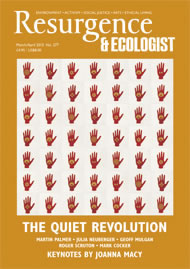Capitalism has pulled millions out of poverty but has also resulted in environmental degradation and a growing gap between rich and poor in many countries. Both capitalism and the corporations and other business organisations that are its main agents need a radically new economic genome to cope with the challenges of the new century.
It’s rare that reading someone else’s book persuades you that a new book you are about to write is going in the wrong direction, but Corporation 2020 did that for (or perhaps to) me. I was on a TGV speeding through France, en route to Lausanne, working through an uncorrected proof of Pavan Sukhdev’s fascinating new book sent to me by Resurgence for review. The purpose of my journey was to spend a few days with sportswear brand Puma’s chairman Jochen Zeitz, mapping out our own new book on tomorrow’s bottom line. And I hadn’t gone more than a few hundred miles, and a hundred or so pages, before I rumbled that Jochen and I were on the wrong tracks.
Puma’s courageous foray into ‘Environmental Profit & Loss’ accounting is seen by Sukhdev, formerly a banker and managing director at Deutsche Bank, as a critical step towards what I long ago dubbed ‘triple bottom line’ accounting. Indeed, a key section of Corporation 2020 focuses on just how badly economics has misled us on externalities, positive and negative.
Stripped to its essentials, the book counterposes the corporate model of the future, dubbed ‘Corporation 2020’, and the corporate model that has actually run (and often ruined) the world since the 1920s, ‘Corporation 1920’, with its “free-market-capitalist, ‘brown economy,’ cost-externalizing DNA”.
One of the most interesting stories in the book is the saga of the court case the Dodge brothers brought against Henry Ford in 1919, challenging Ford’s avowed aim to “employ still more men; to spread the benefits of this industrial system to the greatest possible number”. The Dodge brothers, early investors in Ford, counter-argued that the only purpose of a modern corporation was to make profits for shareholders. Ford, who contended that his company was “an instrument of service rather than a machine for making money”, lost the case.
Nor is it simply a matter of perversely designed corporations: Sukhdev notes that too many efforts to build a green, low-carbon economy stall or meander because of a combination of “market-entry barriers and hostile economic policies, unhelpful laws and taxes, and perverse subsidies”. The result is a globally tilted playing field, with perhaps US$1 trillion a year in perverse subsidies favouring a business-as-usual, brown economy model over more sustainable alternatives.
The challenge now is ecological, in a broader sense: we must reshape the context within which both the corporations and investors operate, progressively marginalising the Corporation 1920 model and further evolving the Corporation 2020 model. The process will be protracted, turbulent and bruising, but Sukhdev concludes: “Pursuing change in the business environment key areas – externalities, leverage, advertising, and resource taxation – will create the conditions that allow a new type of corporation to flourish.”
This is a fairly dense book, and you’ll need a fair appetite for economics to work your way cover to cover, but the timeliness of the thesis was underscored when I was talking to Tom Burke a few days before sitting down to write this review. He argued that we have all the technology we need for a sustainable economy, but we have so far signally failed to address the wider context of value creation, and destruction, including economics, politics and culture.
So keep an eye out for the section of the book that looks at how the world of advertising must change if we are, in the words of Saatchi & Saatchi’s chief sustainability officer Adam Werbach, to succeed in “making sustainability irresistible”. But this sort of revolution won’t be delivered by better ads: we also need to redesign our economics, politics and cultures. And that’s where Jochen and I are now headed.







